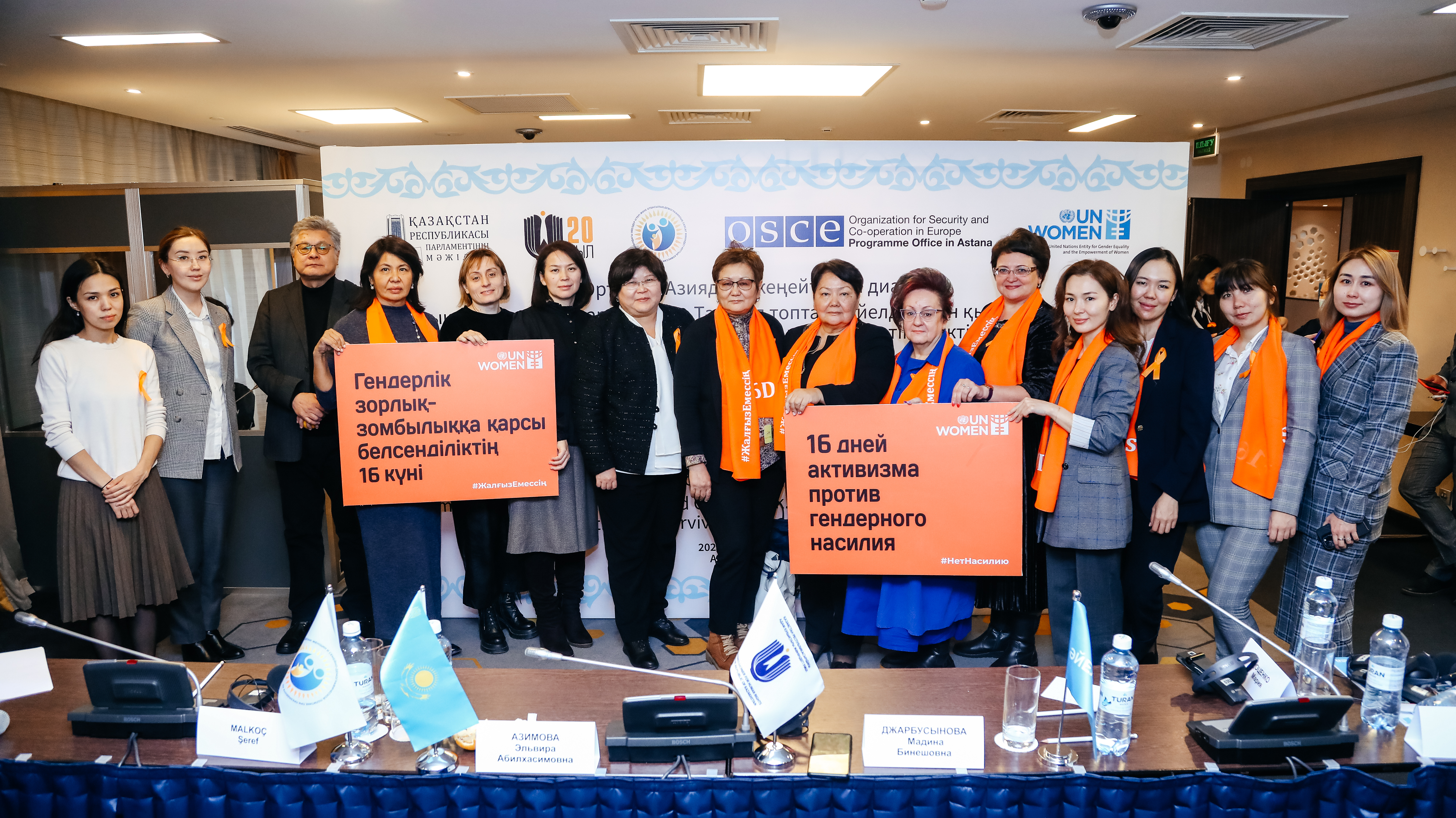Central Asian countries come together to combat gender-based violence
Date:

On November 25, Kazakhstan hosted the Multistakeholder Dialogue in Central Asia on "Combatting the violence: Women and Girls at risk. Addressing root causes of violence and supporting the survivors. Enhancing access to Justice". The event kicked-off the annual United Nations campaign "16 Days of Activism against Gender-based Violence" in Kazakhstan.
Bringing together the members of the Forum of Women Leaders of Central Asia, Ombudspersons and civil society representatives, the Dialogue was organized within the framework of the regional virtual platform "Act for Equal". This platform was initiated by the President of the Republic of Kazakhstan Kassym-Jomart Tokayev as part of Kazakhstan's commitments at the Generation Equality Forum, to share best practices on reaching gender equality and women empowerment.
The roundtable was attended by human rights ombudspersons and leaders of national women’s machineries of Azerbaijan, Kazakhstan, Kyrgyzstan, Mongolia, Uzbekistan, Tajikistan, Turkmenistan and Turkey, as well as representatives of government agencies, international and civil society organizations, human rights defenders and experts from Central Asian countries.
According to the UN, violence against women and girls remains widespread both in Central Asia and around the world. As the organizers of the event noted, 80% of sexual violence survivors in almost all Central Asian countries are women and girls.
"This year's campaign is focused on civil activism and individual participation. Only uniting our efforts, we can eliminate gender-based violence," said Maria Dotsenko, UN Women Representative in Kazakhstan.
Also, as part of the campaign, 39 diplomatic missions and international organizations in Kazakhstan issued a joint statement expressing their readiness to continue to support the government of Kazakhstan and other partners in improving the country's legislation to further protect women and girls against all forms of violence.
"Violence hinders women's full participation in society. Unfortunately, analysis of crime shows that the institution of protection and prevention does not provide complete safety for victims. Despite the legislative regulation of measures, the two-year practice shows their low effectiveness. In this regard, it is necessary to strengthen the response to violence by reformatting the police services within the framework of the "Service Police" initiative, partnering with civil society organizations, developing economic opportunities and skills of women, as well as involving counselors, sociologists and culture experts," emphasized Elvira Azimova, Human Rights Commissioner in the Republic of Kazakhstan.
"Kazakhstan stands in solidarity to eliminate root causes of gender-based violence and help women and girls at risk. In this regard, we have acceded to a number of international Conventions. Moreover, the Head of State at the Meeting of the National Council of Public Trust in 2021 emphasized the need to strengthen the staffing of inspectors to protect women from violence. At present, the number of police officers has doubled and brought up to the standards," said Aigul Nurkina, Deputy of the Mazhilis of the Parliament of the Republic of Kazakhstan.
One of the main topics of discussion was harassment in the workplace. In a joint study on the level of violence and sexual harassment in the workplace by the Republican Research Institute for Labor Protection of the Ministry of Labor and Social Protection of Kazakhstan, Bureau of National Statistics, and UN Women, supported by the National Commission for Women Affairs, Family and Demographic Policy under the President of Kazakhstan, over 80% of respondents noted the need to legally prohibit gender-based violence and harassment in the workplace and strengthen legal protection for survivors. Kazakhstan's accession to the ILO Convention No. 190 on Eliminating Violence and Harassment in the World of Work would be an important step in further improving working conditions.
In light of the measures taken by Kazakhstan to combat gender-based violence, an important step would also be to consider joining the Compact on Women, Peace and Security and Humanitarian Action (WPS-HA). WPS-HA is one of the key outcomes of the Global Generation Equality Forum (Paris, 2021) and tools for accelerating progress toward gender equality.
The event was organized by the Parliament of the Republic of Kazakhstan, Commissioner for Human Rights in the Republic of Kazakhstan, National Commission for Women and Family and Demographic Policy under the President of the Republic of Kazakhstan, Organization for Security and Co-operation in Europe (OSCE) Program Office in Astana and UN Women Kazakhstan, with the support of the Ministry of Foreign Affairs of Kazakhstan and Ministry of Information and Social Development.
For more information, please contact:
- Ms Dinara Kussain, UN Women Communications and Advocacy Analyst in Kazakhstan at +7 701 816 77 06 or dinara.kussain@unwomen.org